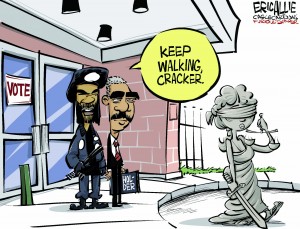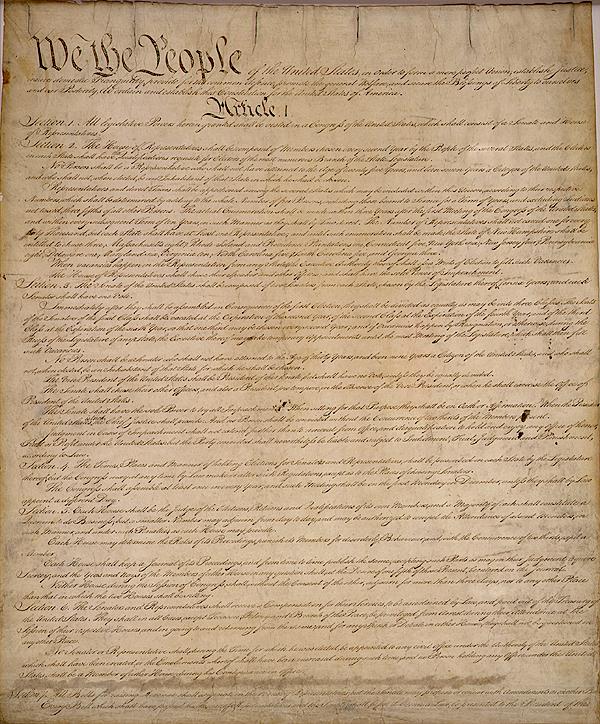
Once, there was only one...
Yikes! Ok, soup for you! I had initially planned to respond to comments on Friends… (Part 2) with return comments, and in fact started that process with Jeff’s comment, but *sigh* it worked itself into something a little more extensive. Part of the reason is the sheer number of journal articles everybody’s comments called to mind. I can’t say how pleasant I found it that everybody was courteous enough to be concerned about offending someone – on the other hand, I was also a little down on the fact that the concern was necessary at all in a rational discussion. If you haven’t read the above post’s comments, they are all worth the read! …and of course, reading these comments is at least in part necessary to make sense of this post.
A small caveat before we get going here – if I can find a link to the journal articles I’ll provide it, otherwise I’ll just provide the journal citation. Now then, part of what caused this excursion is a journal article entitled Boredom, Crime, and Criminology (Ferrell, 2004) and the way its contents triggered a quote Jeff gave me quite some time ago:
We’re the middle children of history, man. No purpose or place. We have no Great War. No Great Depression. Our Great War’s a spiritual war… our Great Depression is our lives.
~Chuck Palahniuk, Fight Club
Why? It’s part and parcel of some of the ideas expressed in the journal article. Part of the point is that when a society/government impoverishes human experience then a response of some sort isn’t a real stretch to expect:
So, for example, when Reclaim the Streets illegally shut down London’s M41 motorway in 1996, the subsequent ‘festival of resistance’ featured booming music, street dancers, carnival figures and a big banner warning of enforced boredom’s apocalyptic consequences: ‘The Society that Abolishes Every Adventure Makes Its Own Abolition the Only Possible Adventure’ (Ferrell, 2004).
Combine these feelings with those of “oppression,” and a certain sense of “entitlement” we might have at least a little explanatory power with crime. The reason I put entitlement in quotes is because it represents a bit more specialized use of the word. When a person or group perceives that they have been deprived of something that another person or group possesses, this is referred to as relative deprivation in a theory by the same name. Although it is commonly associated with poverty, it need not be – it can be a comparison of relative possessions in economic, political, or social deprivations. More to the point, it “sensitize[s] us to the process and emotion of crime” (Webber, 2007). Like I said, I tend toward the eclectic view of crime explanation because specific theories rarely have the explanatory power to encompass all crime. Boredom (and risk taking), oppression (and risk taking), and entitlement (and risk taking) all have some utility in explaining crime, and pretty much all have some foundation in criminological studies.
Given these elements so far, I’ve got to start this the way Jeff did in a follow up post to Tom in the comments section of Friends… (Part 2): “For someone who claims to ‘know nothing, repeat, nothing about crime theory,’ you have some very interesting ideas.” That was an excellent post, Tom. I really enjoyed your take on a synthesis of your own observations and those of your professor’s. I wonder if your professor was a professor of sociology or political science (perhaps even a history professor). The theory placing more emphasis on why there is “more” crime in America rather than what “causes” crime is interesting in itself, and it has as its presupposition about causal factors specific cultural traits or patterns (including cognitive patterns). While this does run contrary to a lot of popular crime theory, it doesn’t run contrary to many well established but less popular theories. Like Jeff’s post, I imagine your thoughts on this might offend some people, but I think many people, both in and out of the field, would find your take on it worth a good look.
There are a number of excellent studies out there concerning voluntary risk taking behavior in terms of crime, as well as an emerging (re-emerging) group of studies choosing to call itself cultural criminology. While cultural criminology pays attention to historical narrative (Tom’s list of reasons for coming to America), it also emphasizes current cultural influences; for example, media representations of what one should believe. I am fairly certain that elements of these theories would be found “objectionable” or “offensive” to some people. Despite that, elements of these reflect Tom’s thinking about risk taking and our own histories.
The antecedents of cultural criminology lie within the longstanding recognition of the importance of cultural ethnographies and artifacts in understanding human social behaviour. This ongoing tradition acknowledges that what is important is the analysis of the way in which humankind makes sense of and, at times resists, existing and developing social structures. Such privileging of ‘culture’ enables cultural theorists to view behavior as dynamic rather than determined and opens up the possibility of other ways of ‘seeing’ transgressive and therefore criminal behavior (Presdee, 2004).
Finally, both Tom and Mr. Grim point out something that is worth quoting to introduce the last “theory” associated with their comments. First, Tom wrote:
I also believe that the breakdown of society is a big factor in crime. Most societies are constructed to maintain a certain order. Much of this is done through peer pressure. But, peer pressure will affect crime in two ways, in my opinion. One, when there is sufficient peer pressure as in small towns where everyone knows one another; it is more difficult to break the societal norms (laws). Also, in big cities, there is more anonymity and fewer peers to apply the pressure to adhere to societal norms. Two, is the situation when there is peer pressure to break down societal norms (break laws) as occurs in gangs. As Jeff, above, comments, this can be a very big cause in antisocial behavior, law breaking.
And second, Mr. Grim put it this way:
I would like to back things away from those who actually broke rules of sufficient stature to deserve punishment through our criminal justice system for a minute. Instead, I would like to point my pudgy finger at what I term “the rule-breakers”.
“Who are the rule-breakers,” you may ask?
Why, it is all of us. You, me, Hell just about anyone you may know qualifies as a “rule-breaker”.
Little things, like parking in a fire zone while you jump out to use the ATM. You know you’re not supposed to, but you do it anyway. Or driving 70 MPH on a 65 MPH zone. Bah, it’s a stupid rule anyway. Or throwing that candy wrapper in a nearby bush instead of shoving it in your pocket until you can find a garbage can. Meh, it’s paper, sort of, it’ll biodegrade.
Each of these can be seen as expression of James Q. Wilson and George C. Kelling’s ideas that came to be known as the “Broken Windows Theory.” I’ll focus less on risk taking and more on “societal breakdown” for reasons of space, but both elements are expressed in current criminology theory.
First, the broken windows concept focuses on neighborhoods and communities rather than “cities at large.” In other words, it focuses on logical patrol areas. More important, it focuses on precisely what Mr. Grim called “rule breakers.” The idea with the community policing concept was to establish the “informal rules” as well as formal rules for the neighborhood and enforce them as a community. While the reason for breaking the rules (stupid rule, lemmings, or being inconsiderate) is less important than the fact that they are being broken, the primary idea is that the community as individuals must have the moral courage to support their rules. Littering, jumping subway turnstiles, harassing passersby, etc. are all examples. It’s worth a portion of the article here:
The people on the street were primarily black; the officer who walked the street was white. The people were made up of “regulars” and “strangers.” Regulars included both “decent folk” and some drunks and derelicts who were always there but who “knew their place.” Strangers were, well, strangers, and viewed suspiciously, sometimes apprehensively. The officer – call him Kelly – knew who the regulars were, and they knew him. As he saw his job, he was to keep an eye on strangers, and make certain that the disreputable regulars observed some informal but widely understood rules. Drunks and addicts could sit on the stoops, but could not lie down. People could drink on side streets, but not at the main intersection. Bottles had to be in paper bags. Talking to, bothering, or begging from people waiting at the bus stop was strictly forbidden. If a dispute erupted between a businessman and a customer, the businessman was assumed to be right, especially if the customer was a stranger. If a stranger loitered, Kelly would ask him if he had any means of support and what his business was; if he gave unsatisfactory answers, he was sent on his way. Persons who broke the informal rules, especially those who bothered people waiting at bus stops, were arrested for vagrancy. Noisy teenagers were told to keep quiet.
These rules were defined and enforced in collaboration with the “regulars” on the street. Another neighborhood might have different rules, but these, everybody understood, were the rules for this neighborhood. If someone violated them the regulars not only turned to Kelly for help but also ridiculed the violator. Sometimes what Kelly did could be described as “enforcing the law,” but just as often it involved taking informal or extralegal steps to help protect what the neighborhood had decided was the appropriate level of public order. Some of the things he did probably would not withstand a legal challenge (Wilson & Kelling, 1982).
Second, it is worth an extended quotation to explain where the broken windows idea originates because it describes Tom’s notions of societal breakdown in terms of Mr. Grim’s rules:
…at the community level, disorder and crime are usually inextricably linked, in a kind of developmental sequence. Social psychologists and police officers tend to agree that if a window in a building is broken and is left unrepaired, all the rest of the windows will soon be broken. This is as true in nice neighborhoods as in run-down ones. Window-breaking does not necessarily occur on a large scale because some areas are inhabited by determined window-breakers whereas others are populated by window-lovers; rather, one unrepaired broken window is a signal that no one cares, and so breaking more windows costs nothing. (It has always been fun.)
Philip Zimbardo, a Stanford psychologist, reported in 1969 on some experiments testing the broken-window theory. He arranged to have an automobile without license plates parked with its hood up on a street in the Bronx and a comparable automobile on a street in Palo Alto, California. The car in the Bronx was attacked by “vandals” within ten minutes of its “abandonment.” The first to arrive were a family – father, mother, and young son – who removed the radiator and battery. Within twenty-four hours, virtually everything of value had been removed. Then random destruction began — windows were smashed, parts torn off, upholstery ripped. Children began to use the car as a playground. Most of the adult “vandals” were well dressed, apparently clean-cut whites. The car in Palo Alto sat untouched for more than a week. Then Zimbardo smashed part of it with a sledgehammer. Soon, passersby were joining in. Within a few hours, the car had been turned upside down and utterly destroyed. Again, the ‘vandals” appeared to be primarily respectable whites.
Untended property becomes fair game for people out for fun or plunder, and even for people who ordinarily would not dream of doing such things and who probably consider themselves law-abiding. Because of the nature of community life in the Bronx — its anonymity, the frequency with which cars are abandoned and things are stolen or broken, the past experience of “no one caring” — vandalism begins much more quickly than it does in staid Palo Alto, where people have come to believe that private possessions are cared for, and that mischievous behavior is costly. But vandalism can occur anywhere once communal barriers — the sense of mutual regard and the obligations of civility — are lowered by actions that seem to signal that “no one cares.”
We suggest that “untended” behavior also leads to the breakdown of community controls. A stable neighborhood of families who care for their homes, mind each other’s children, and confidently frown on unwanted intruders can change, in a few years or even a few months, to an inhospitable and frightening jungle. A piece of property is abandoned, weeds grow up, a window is smashed. Adults stop scolding rowdy children; the children, emboldened, become more rowdy. Families move out, unattached adults move in. Teenagers gather in front of the corner store. The merchant asks them to move; they refuse. Fights occur. Litter accumulates. People start drinking in front of the grocery; in time, an inebriate slumps to the sidewalk and is allowed to sleep it off. Pedestrians are approached by panhandlers… (Wilson & Kelling, 1982).
Now those are the two elements associated with Tom and Mr. Grim’s ideas in their posts. An important element of Tom’s, and the last major idea in this post, is Tom’s statement:
He made the assumption that a very large part of our Society was made up of those who lacked a respect for ruling authority and law. Hence we had more people willing to risk going against that law and the society that supported the law. I tend to believe he is onto something.
I agree. So do Wilson and Kelling. The corollary of course is that people don’t simply pay lip service to the support of law and order. It needs to be tangible. Respect for the ruling authority and law is important. Why? In keeping with Mr. Grim’s rubric, well, a certain friend of mine once said something to the effect, “I hate cops. I have absolutely no respect for them, and if they don’t like that they should find another line of work.” Same caveat goes: “please note that the quotes are to indicate dialogue and are not meant to indicate the statement is verbatim.” Whether it’s laws, rules, police, judges, etc., that we think are stupid or useless, should we not, make use of our democratic processes to change the nature of the laws, rules, police, judges, etc?
For the most part I would say yes. Of course, like any other problem solving exercise, it’s important to start isolating those elements most in need of change and those that really won’t make a difference for each community. Also, for the most part, I would suggest that Tom and Mr. Grim have the best take on what to fix first – the broken windows in our part of the neighborhood. That was my primary reason for writing this – to note that people thinking about crime and its causes tend to bring up elements or pieces of existing theory – knowing part of the problem gets us on the way to answering: “What do we do to fix it?”
“Crime seems to me to be as complex as any other human emotion, action, or desire. That is why it deserves study.” And that “…we want our neighbors to act as we do and want to understand how to keep them from acting out against societal norms.” Mostly, it seems like many people agree, and yet we tend not to want to talk, debate, and argue over these elements that would help us produce change.
Huge thanks to you guys for an excellent discussion of the causes and correlates of crime. I really appreciate the discussion and I hope it provides some inspiration for some of the many ways we can each do our part. So a little anecdote/story about a mutual person of interest between Mr. Grim and me.
I was returning to work from lunch one day, and parked near the back of a full parking lot. As I turned toward the street I heard and saw two things that occurred in swift succession. First I saw a pop can leave the hands of a male on a BMX bike. Second, about the time I heard the full pop can strike the street, I heard my boss bellow, “HEY! Pick that up!” The teenager (I think), obviously embarrassed, stopped his bike and picked up the pop can.
Cheers All!
Ferrell, J., “Boredom, crime, and criminology,” Theoretical Criminology, Vol. 8, No. 3, 287-302 (2004)
Webber, C., “Revaluating relative deprivation theory,” Theoretical Criminology, Vol. 11, No. 1, 97-120 (2007)
Presdee, M., “Cultural Criminology: The long and winding road,” Theoretical Criminology, Vol. 8, No. 3, 275-285 (2004)
Wilson, J.Q. and Kelling, G.L., “Broken Windows,” The Atlantic, March (1982); there is also a PDF version of this article at the Manhattan Institute.
Like this:
Like Loading...
 Joe Nocera at the NYT had a great little opinion piece, and it resonated with me because I remember the nastiness to which he refers. Especially the lead up to a vote that revealed some vile human beings in our legislature. You expect some nastiness in advocacy groups, but until then, the senate actually was a “collegial round table.” But hey, it’s an anniversary, so let’s celebrate The Nastiness!
Joe Nocera at the NYT had a great little opinion piece, and it resonated with me because I remember the nastiness to which he refers. Especially the lead up to a vote that revealed some vile human beings in our legislature. You expect some nastiness in advocacy groups, but until then, the senate actually was a “collegial round table.” But hey, it’s an anniversary, so let’s celebrate The Nastiness!









